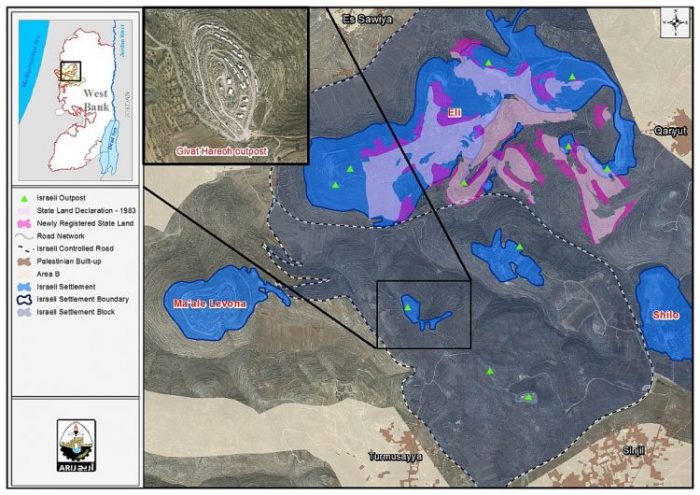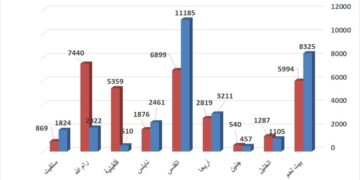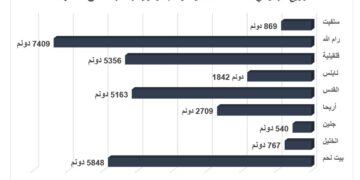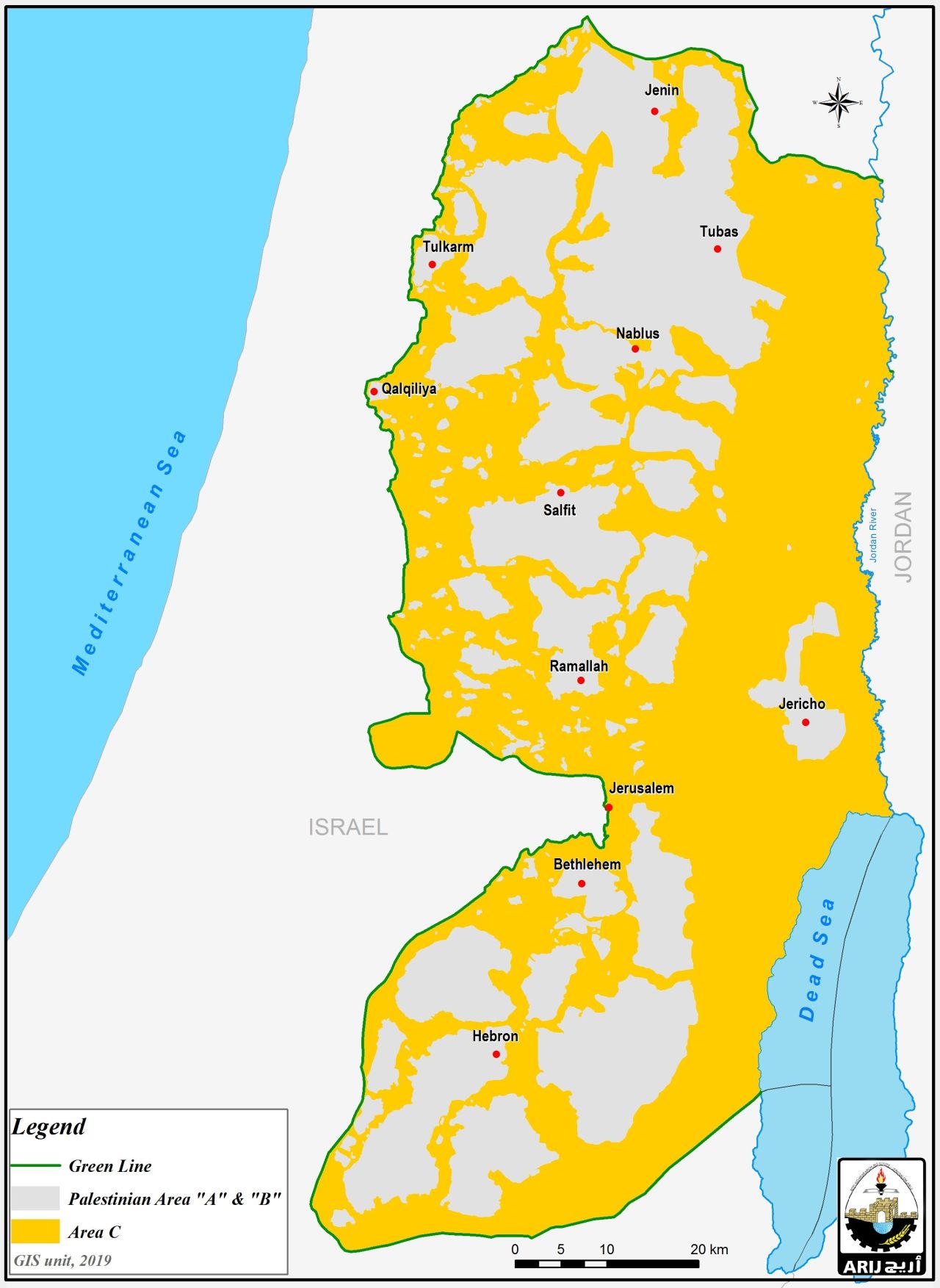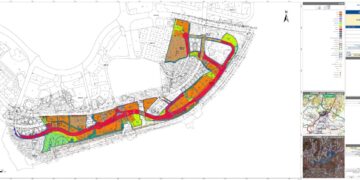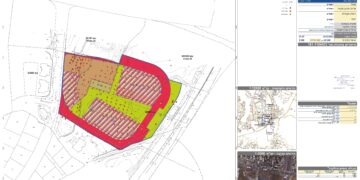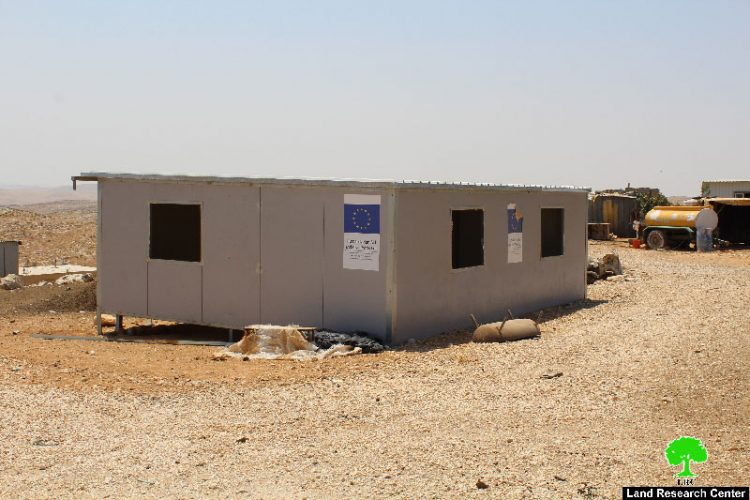On a hilltop to the south of Eli settlement, stands the Israeli outpost of Givat HaRoeh in the occupied West Bank. Nowadays, the outpost is undergoing extensive expansion despite an Israeli decision back in 2003 to demolish it. The outpost was established in mid-2002, on lands of Sinjil village in Ramallah Governorate. Today the outposts has almost 30 structures and is home to almost 22 Jewish families. See Photos below
Photos 1-2: Expansion underway in Givat HaRoeh outpost
Map 1: Location of Givat HaRoeh outpost in Ramallah Governorate
What makes the Israeli Government want to keep Givat HaRoeh outpost?
Israel's settlement plans in the occupied West Bank territory do not end on confiscating and annexing the 13% percent of the West Bank territory (733 Km²) along the western terrains with the ongoing construction of the Israeli Segregation Wall, neither on controlling and isolating the eastern terrains of the West Bank Territory (the Jordan Valley and Dead Sea, 29% (1664 Km2), but it seeks to control the area in between and transform it to corridors/blocs, in an attempt to establish a territorial contiguity between the two Israeli occupied areas, the western and eastern terrains of the West Bank, or what has become known to the Palestinians as the Western and Eastern Segregation Zones[1]
By doing so, Israel will manage to engulf a cluster of Israeli settlements and outposts located in these areas; thus increasing the number of settlements and outposts it is annexing to its proper[2] and affecting the outcome of the final status negotiations and the creation of a viable and sustainable Palestinian state.
The Givat HaRoeh is one Israeli outpost among many others (more than 100 Israeli outposts) that are located in the Israeli so-known corridors/blocs area in the occupied West. The outpost is bordered by Eli Settlement in the north, Ma’ale Levona settlement in the west, Shilo settlement and Giv’ay Harel outpost in the east, Sinjil and Turmusayya villages in addition to two other outposts (Eli South (Hill 792) and Eli south) in the south. Its strategic location explores the importance to not dismantle/demolish it despite its small size and the area it occupies; but to reserve the land for future annexation of the area.
A summary of events related to Giv’at Ha’oreh outpost
- In 2003, the so-called “Israel Defense Forces GOC Central Command” ordered the demolition of the Givat HaRoeh outpost.
- In November 2003 and following the decision of the GOC, a new Israeli bypass road[3] had been paved for the sake of Givat HaRoeh to link it with the existing Eli settlement, to its north. The road was constructed with the support of settlers living in the outpost, heads of the Binyamin Regional Council and some politicians.
- In June 2004, the Israeli High Court of Justice issued a temporary order barring the evacuation and dismantling of Givat HaRoeh outpost until a petition against its evacuation is heard in the court[4].
- In September 2004[5], the Israeli High Court of Justice rejected a petition filed by settlers of Givat HaRoeh outpost and the Amana settlement organization[6], against their eviction and dismantling of the outpost, and gave the green light to the Israeli Army to evacuate the outpost.
- In 2007, the Peace Now movement petitioned to the Israeli High Court to implement the demolition order of the outpost (of 2003), however no real application was implemented on the ground by the state of Israel.
- In 2007, ARIJ[7] reported that some Jewish Settlers' groups marched towards several locations in the West Bank in an attempt to set up nine new settlements' outposts. The inauguration of these outposts was planned to take place, as declared by the settlers, on the 9th of December 2007 with the goal of establishing permanent communities to settle new Jewish families in them. Organizations supporting settlers' actions are 'Land of Israel Faithful', 'Youth for Eretz Yisrael', Women in Green and the local grassroots action committees. Among the 9 outposts, the Givat HaRoeh ('Hilltop of the Light'), was listed.
- In February 2011, the Israeli Prime Minister, Benjamin Netanyahu, decided that Givat HaRoeh outpost, among three others, would be demolished[8].
- In October 2011, the Israeli Prime Minister, Benjamin Netanyahu[9], announced the establishment of a new committee that will be responsible to find ways to legalize settlement outposts built on private Palestinian land. The committee is charged to examine policy tools and principles of action, relating to construction with unregulated status in the occupied West Bank. The outposts of Migron, Givat Asaf, Givat HaRoeh, Ramat Gilad and Bnei Adam are among many others to be checked.
- On May 16, 2013, and in clear violation of the so-called Israel Defense Forces GOC Central Command order of 2013, the Israeli daily newspaper Haaretz[10] reported that “Israel plans to retroactively legalize four unauthorized[11] West Bank settlement outposts already slated for demolition”, and established without the Israeli Government official permission, among which, the outpost of Givat HaRoeh. With regard to Givat HaRoeh outpost, the state of Israel stated that it plans to examine the status of the land on which the outpost of Givat HaRoeh was constructed.
-
In November 2013, the Israeli High court [12]of Justice criticized the state of Israel for failing to fulfill its legal commitments regarding West Bank outposts, as it ordered the demolition and dismantling of homes in outposts that were built on private Palestinian land and most specifically Ma’aleh Rehavim, Givat Assaf and Mitzpe Yizhar, within six months.
The court ruling came in response to a 2007 Peace Now petition seeking to demolish six outposts in their entirety with the claim that they were illegally built. However, the court ordered that the three other outposts stated in the PEACENOW petition – Mitzpe Lachish, Givat Haroeh and Ramat Gilad – will be allowed to remain in their entirety and ordered the state of Israel to take active steps to legalize the homes built on state or “survey land” of unclear ownership within five of the six outposts, including Givat HaRoeh outpost. - On the 7th of December 2014, the Israeli High Court issued its ruling with regard to Peace Now’s[13] petition number 7891/07 which demanded to carry out Central Command’s delimitation orders and evacuate six West Bank outposts built on private Palestinian land. The court stated that “the state must evacuate structures in the outposts located on private Palestinian land, but that there is no place for the court to intervene in the state's prioritization of delimitation orders enforcement”. The Six Outposts are Mitzpeh Lachish, Ma’ale Rehavam and Ramat Gilad, Givat HaRoeh and Mitzpe Yetzhar.
- On the 18th of November 2015: The Israeli daily newspaper Haaretz [14] reported on its website that Israeli government is ignoring the construction of two new settler roads in the West Bank, which are meant to replace two other roads the Israeli Supreme Court ordered to be demolished. The State of Israel claimed that “the two new roads have never been challenged in court, so there is no reason they cannot be built.”
The road is being constructed to connect Givat HaRoeh outpost with Ma’ale Levona settlement. The State of Israel claims that the land is of undetermined ownership, having the status of “survey land,” for which no in-depth examination of the ownership has been conducted. However, this new road is meant to replace an existing one that the High Court of Justice ordered to be demolished because it is partly constructed on privately owned Palestinian land.
To conclude,
Dismantling settlement outposts and freezing settlement construction in the occupied West Bank is the first step for Israel to show its interest in reaching a just and durable peace with the Palestinians. However, on the ground, Israel is backing the legalization of settlement outposts despite their illegality and continue to expand settlements elsewhere in the oWB, in clear violation of the international law rules and norms and with no regard to the consequences of such actions on the neighboring Palestinian communities.
[1] This is due to the Israeli restrictions imposed on Palestinians living in these areas as a result of the construction of the wall, and the Israeli policies in the Jordan Valley area.
[2] Israel has completed the construction of more than 60% of the wall in the occupied Palestinian territory and upon its completion, it will guarantee the annexation of 107 Israeli settlements (out of 196 total in the oWB) and 60 outposts to Israel’s unilateral and illegal border. Additionally, 38 Israeli settlements and 32 outposts are in the Eastern Segregation Zone
[3] The Lie of the Land
http://www.haaretz.com/the-lie-of-the-land-1.106441
[4] High Court puts Givat Haroeh evacuation on hold
http://www.haaretz.com/news/high-court-puts-givat-haroeh-evacuation-on-hold-1.125836
[5] High Court OKs Demolition of Givat Haroeh
http://www.israelnationalnews.com/News/Flash.aspx/69108
[6] an Israeli pro-settler organization established in 1978
[7] Israeli settlers to set up 9 new outposts in different areas of the West Bank
/2007/12/israeli-settlers-to-set-up-9-new-outposts-in-different-areas-of-the-west-bank/
[8] Israel to Legalize Four West Bank Settlement Outposts Slated for Demolition
read more: http://www.haaretz.com/israel-news/israel-to-legalize-four-west-bank-settlement-outposts-slated-for-demolition-1.524291
[9] Israel 'to legalise outposts on private Palestinian land'
http://reliefweb.int/report/occupied-palestinian-territory/israel-legalise-outposts-private-palestinian-land
[10] Israel to Legalize Four West Bank Settlement Outposts Slated for Demolition
[11] Givat Asaf, located near Beit El;
Mitzpeh Lakhish in the southern Hebron hills;
Ma’aleh Rehavam in Gush Etzion; and
Givat Haroeh, near the settlement of Eli.
[12] High Court orders state to demolish outpost homes on private Palestinian property
[13] Shalom Achshav Press Release: Israeli High Court Verdict on Peace Now's Six Outposts Petition
https://peacenow.org/entry.php?id=9668#.V6WwHvl96M8
[14] Israel Ignoring Construction of Two Unauthorized West Bank Roads, Including One on Palestinian Land
read more: http://www.haaretz.com/israel-news/.premium-1.686841
Prepared By
The Applied Research Institute – Jerusalem
ARIJ

